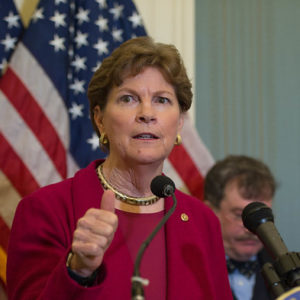In parts of rural North Carolina devastated by Hurricane Helene, some stranded Tarheels have text and other internet access today thanks to Elon Musk and his high-tech Starlink system.
In parts of rural New Hampshire, untouched by inclement weather, Granite Staters still don’t have high-speed broadband today, despite a $42 billion boondoggle pushed by U.S. Sen. Jeanne Shaheen and the Biden administration.
On Nov. 15, 2021, President Joe Biden signed the Infrastructure Investment and Jobs Act, a $1.2 trillion spending package that included more than $42 billion to connect Americans without reliable internet access to broadband.
Shaheen (D-N.H.) proudly took credit for “writing the broadband provisions that created the BEAD (Broadband, Equity, Access, and Deployment) program” in the infrastructure bill, touting her role as “the Democratic negotiator on broadband provisions in the historic bipartisan infrastructure law.”
But nearly three years after the infrastructure bill was signed, Shaheen’s BEAD program has not connected a single person to the internet. And according to the Federal Communications Commission (FCC), the first hookups won’t occur until next year at the earliest.
Instead, FCC Commissioner Brendan Carr notes, his agency voted to cancel an $885 million agreement with Starlink that would have already connected thousands of households, and is being used in the flooded corners of Appalachia right now.
“The government in 2022 revoked an award to Starlink that would have delivered high-speed internet to 642,000 rural locations,” Carr said. That compares to zero connected by the BEAD program, he notes.
Shaheen has declined to respond to repeated requests for comment regarding her role in the program.
And once the Shaheen legislation was passed, the job of implementing it went to the administration’s “Broadband Czar,” Vice President Kamala Harris.
In April 2021, President Joe Biden announced he was assigning the task of achieving universal high-speed internet access to Harris. “It is going to help our kids and our business to succeed in the 21st century,” Biden said. “I’m asking the vice president to lead this effort because I know it will get done.”
Not quite.
In September, a group of GOP senators led by Sen. John Thune (R-S.D.) wrote Harris demanding accountability and blaming the Biden administration’s decision to put politics ahead of results.
“By imposing burdensome climate change mandates on infrastructure projects, prioritizing government-owned networks over private investment, mandating the use of unionized labor in states, and seeking to regulate broadband rates, your administration has caused unnecessary delays leaving millions of Americans unconnected,” they wrote.
On Wednesday, Carr posted a video on social media of Harris delivering remarks on March 21, 2022, regarding the BEAD during a visit to Louisiana. She proudly announced that state’s share of broadband-earmarked taxpayer dollars would be $29.9 million.
“We were all doing a tour of the library here and talking about the significance of the passage of time,” Harris began. “Right? The significance of the passage of time.
“So, when you think about it, there is great significance to the passage of time in terms of what we need to do to lay these wires, what we need to do to create these jobs. And there is such great significance to the passage of time when we think about a day in the life of our children and what that means to the future of our nation,” Harris said.
“Talk about the passage of time,” Carr quipped. “VP Harris has been leading the administration’s $42 billion plan to expand internet infrastructure for 1,059 days. After all of that time, not one person has been connected to the internet with those dollars. No projects are even underway.”
Americans for Tax Reform (ATR) issued a report in August on Harris’s role as “point person” in the broadband push, and noting the BEAD program “requires that most of the work be completed within five years of the law taking effect, meaning most of the projects to reach rural, unserved areas will blow past that deadline at the current pace.”
ATR President Grover Norquist was in New Hampshire Wednesday attending a Taxpayer Pledge event and he was asked about Shaheen’s legislation and the zero-connection outcome.
“Jeanne Shaheen is not interested in people having broadband,” Norquist told NHJournal. “She was interested in a press release that said, ‘Look, look at me.’”
Carr says progressive politics is directly responsible for the results. He identifies a “liberal wish list” of mandates on would-be contractors that includes climate change mandates, technology biases, DEI (diversity, equity, and inclusion) requirements, and favoring government-run networks over private providers.
A copy of the BEAD frequently asked questions manual, produced by the National Telecommunications and Information Administration, mentions the words “equity” 85 times.
“The Biden administration’s failure to turn even a single shovel’s worth of dirt with this $42.45 billion is not just predictable, it was predicted,” Carr said.





